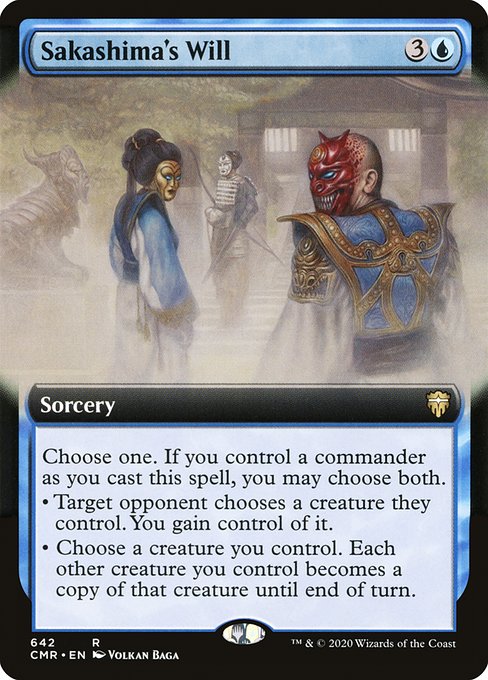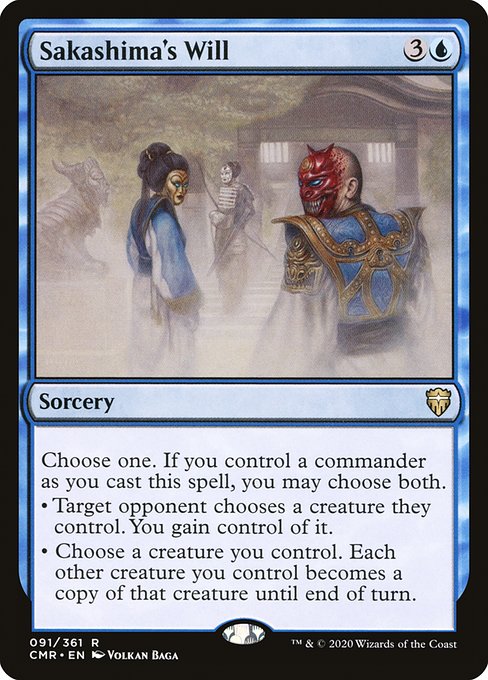standard
future
historic
gladiator
pioneer
explorer
modern
legacy
pauper
vintage
penny
commander
brawl
alchemy
paupercommander
duel
oldschool
premodern
Rulings
There’s no extra bonus if you control more than one commander.
Once you’ve announced that you’re casting a spell, players can’t take any actions until you’ve finished doing so. Notably, opponents can’t try to remove your commander to change how many modes you may choose.
Sakashima’s Will copies the printed values of the chosen creature. It won’t copy any counters on that creature or any effects that have changed its power, toughness, types, color, and so on. Notably, it won’t copy effects that made the chosen creature become a creature if it isn’t normally a creature. For example, if you choose a land that’s become a creature, all your other creatures will become noncreature lands until end of turn.
Even though the card is named after a specific character, controlling any commander will satisfy its condition.
The second mode doesn’t target any creature. You choose the creature that will be copied as Sakashima’s Will resolves. If you chose both modes, the creature you gained control of because of the first mode can be chosen for your other creatures to copy.
If the chosen creature is copying something else, other creatures you control become copies of whatever the chosen creature is copying.
The commander you control doesn’t have to be your commander.
Choosing a token won’t cause other nontoken creatures you control to become tokens. If you choose a nontoken creature, other creature tokens you control won’t stop being tokens.
Once you’ve chosen both modes for the spell, it doesn’t matter whether you continue to control a commander. This is true even if you somehow no longer control a commander as you finish casting the spell.
Once you’ve announced that you’re casting a spell, players can’t take any actions until you’ve finished doing so. Notably, opponents can’t try to remove your commander to change how many modes you may choose.
Sakashima’s Will copies the printed values of the chosen creature. It won’t copy any counters on that creature or any effects that have changed its power, toughness, types, color, and so on. Notably, it won’t copy effects that made the chosen creature become a creature if it isn’t normally a creature. For example, if you choose a land that’s become a creature, all your other creatures will become noncreature lands until end of turn.
Even though the card is named after a specific character, controlling any commander will satisfy its condition.
The second mode doesn’t target any creature. You choose the creature that will be copied as Sakashima’s Will resolves. If you chose both modes, the creature you gained control of because of the first mode can be chosen for your other creatures to copy.
If the chosen creature is copying something else, other creatures you control become copies of whatever the chosen creature is copying.
The commander you control doesn’t have to be your commander.
Choosing a token won’t cause other nontoken creatures you control to become tokens. If you choose a nontoken creature, other creature tokens you control won’t stop being tokens.
Once you’ve chosen both modes for the spell, it doesn’t matter whether you continue to control a commander. This is true even if you somehow no longer control a commander as you finish casting the spell.
Rulings
There’s no extra bonus if you control more than one commander.
Once you’ve announced that you’re casting a spell, players can’t take any actions until you’ve finished doing so. Notably, opponents can’t try to remove your commander to change how many modes you may choose.
Sakashima’s Will copies the printed values of the chosen creature. It won’t copy any counters on that creature or any effects that have changed its power, toughness, types, color, and so on. Notably, it won’t copy effects that made the chosen creature become a creature if it isn’t normally a creature. For example, if you choose a land that’s become a creature, all your other creatures will become noncreature lands until end of turn.
Even though the card is named after a specific character, controlling any commander will satisfy its condition.
The second mode doesn’t target any creature. You choose the creature that will be copied as Sakashima’s Will resolves. If you chose both modes, the creature you gained control of because of the first mode can be chosen for your other creatures to copy.
If the chosen creature is copying something else, other creatures you control become copies of whatever the chosen creature is copying.
The commander you control doesn’t have to be your commander.
Choosing a token won’t cause other nontoken creatures you control to become tokens. If you choose a nontoken creature, other creature tokens you control won’t stop being tokens.
Once you’ve chosen both modes for the spell, it doesn’t matter whether you continue to control a commander. This is true even if you somehow no longer control a commander as you finish casting the spell.
Once you’ve announced that you’re casting a spell, players can’t take any actions until you’ve finished doing so. Notably, opponents can’t try to remove your commander to change how many modes you may choose.
Sakashima’s Will copies the printed values of the chosen creature. It won’t copy any counters on that creature or any effects that have changed its power, toughness, types, color, and so on. Notably, it won’t copy effects that made the chosen creature become a creature if it isn’t normally a creature. For example, if you choose a land that’s become a creature, all your other creatures will become noncreature lands until end of turn.
Even though the card is named after a specific character, controlling any commander will satisfy its condition.
The second mode doesn’t target any creature. You choose the creature that will be copied as Sakashima’s Will resolves. If you chose both modes, the creature you gained control of because of the first mode can be chosen for your other creatures to copy.
If the chosen creature is copying something else, other creatures you control become copies of whatever the chosen creature is copying.
The commander you control doesn’t have to be your commander.
Choosing a token won’t cause other nontoken creatures you control to become tokens. If you choose a nontoken creature, other creature tokens you control won’t stop being tokens.
Once you’ve chosen both modes for the spell, it doesn’t matter whether you continue to control a commander. This is true even if you somehow no longer control a commander as you finish casting the spell.
Your collection? Your decks?
Want to manage your collection and/or create decks?


 0
0
 0.61€
0.61€
